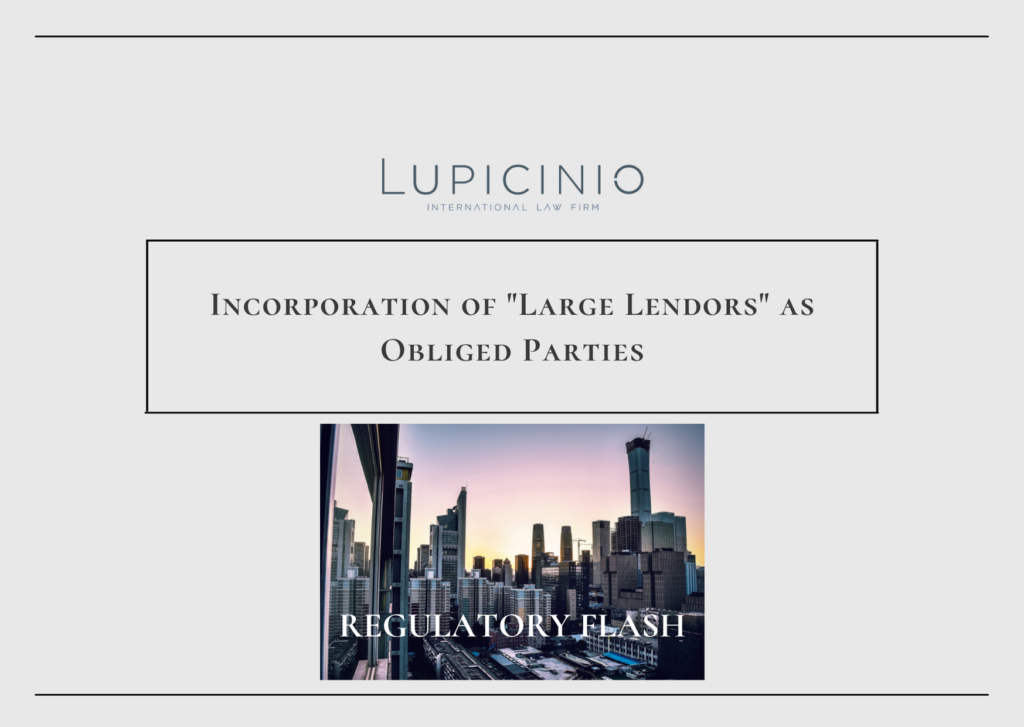Royal Decree Law 7/2021 of 27 April.
Amendment of Law 10/2010 of 28 April 2010 on the prevention of money laundering and terrorist financing.
INCORPORATION OF “LARGE LESSORS” AS REGULATED ENTITIES
On 29 April 2021, Royal Decree-Law 7/2021, of 27 April, on the transposition of certain European Union directives on various matters, including the prevention of money laundering, published in the Official State Gazette the previous day, came into force.
One of the new features incorporated by the regulation when amending Law 10/2010 of 28 April on the prevention of money laundering is the extension of the Obligated Parties in the field of promotion, agency, commission or intermediation activities in the sale and purchase of real estate, extending the scope of parties obliged to comply with this regulation to what could be called “large lessors“, not so much by number of leases – the existence of a single lease being sufficient – but exclusively based on the amount of the monthly rent in excess of €10,000 or €120,000 on an annual basis.
| Article 2. Parties under obligation 1. l) | |
| Previous wording | New wording |
|
l) Property developers and those who professionally exercise agency, commission or intermediation activities in the sale and purchase of real estate.
|
l) Property developers and those who professionally carry out activities of agency, commission or intermediation in the sale and purchase of real estate or in the leasing of real estate that involve a transaction for a total annual income equal to or greater than 120,000 euros or a monthly income equal to or greater than 10,000 euros.
|
This consideration of “large lessors” as obliged parties for the purposes of money laundering prevention regulations entails the assumption by the company or “large lessor” of a set of due diligence obligations (formal identification, real ownership, business purpose, monitoring, etc.), as well as the obligation to notify the Executive Service of the Commission for the Prevention of Money Laundering and Monetary Offences (SEPBLAC) of any fact or transaction in relation to which there is an indication or certainty that the company or “large lessor” is not obliged to do so.), as well as the obligation to notify the Executive Service of the Commission for the Prevention of Money Laundering and Monetary Offences (SEPBLAC) of any fact or transaction for which there is an indication or certainty of its relation to money laundering or the financing of terrorism.
Similarly, and among many other obligations, the company’s status as a regulated entity entails the need to have in place adequate policies and procedures for due diligence, reporting, record keeping, internal control, risk assessment and management, ensuring compliance with relevant provisions and communication, in order to prevent and deter operations related to money laundering or terrorist financing.
Finally, it should be recalled that Chapter VIII of Law 10/2010 of 28 April on the prevention of money laundering and terrorist financing (arts. 50 et seq.) contains a particularly relevant penalty regime for cases of non-compliance with the regulations.
We remain at your disposal for further information or to answer any questions you may have on this subject.
FOR MORE INFORMATION:
Ángel Lavín
Email: alm@lupicinio.com
Luis Manuel García
Email: lmg@lupicinio.com
DOWNLOAD HERE:
NOTE ON FLASH Modification of the Law on the Prevention of Money Laundering LANDLORDS May 2021
This publication contains information of a general and informative nature and does not constitute legal advice. © 2021 LUPICINIO INTERNATIONAL LAW FIRM
More information:
Lupicinio International Law Firm
C/ Villanueva 29
28001 Madrid
T: +34 91 436 00 90
F: +34 91 587 24 99







